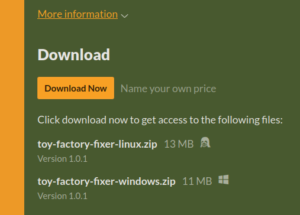Last week, I reported that I finally finished my Linux-based port of Toy Factory Fixer.
This past week, I set out to focus on the work of actually publishing it.
Sprint 61: Ports
Planned and Complete:
- Create Windows port
- Create itch.io page
It’s always a good feeling to finish all of the work I set out to do.
I didn’t know how long the Windows port work would take, and since the Linux port was finished, I wanted to get that into the hands of players as soon as I could.
I wanted to publish my games on itch.io, the open marketplace for independent digital creators with a focus on independent video games. I already have an account there due to some major charity bundles they hosted, and I like how the organization is so creator-friendly and also proactive about keeping the site toxic-free, so I started by learning what it takes to create a page.
And then…I made a page for the game.
The itch.io page editing tools were for the most part quite intuitive, and other than needing to shrink some of my animated GIFs to fit their 3MB limit, it made me wish there was an itch.io-inspired theme for WordPress because I love the way my game’s page looks and would love to match it on my own website.
I’ll be announcing the game’s release quite soon (as in, this week), so sign up for the newsletter (see below) if you want to hear about it first!
In the meantime, I found that creating the Windows port was fairly straightforward, but I also discovered that some code had to be changed that was causing some compatibility issues.
Specifically I have code using std::fabs, which I changed to abs, but it turned out that I was using the C version of it that only handles integers rather than the floating point version that comes from specifying std::abs from <cmath>.
I also realized that my Linux port had no music-playing capability, namely due to the custom SDL2_mixer library not being able to find OGG Vorbis in my docker container. The docs only mention that it needs OGG/Vorbis libraries installed on the system, but until I installed the libvorbis-dev package, I was struggling to figure out exactly which of the handful of libraries to install. So, hopefully that helped you if you ran into something similar.
The main problem with my Windows build was investigating what it takes to sign the executable. Basically, if the executable isn’t signed, then Windows likes to put up a scary modal dialog informing the player that this could be something dangerous from the Internet.
From what I could tell, it sounds like I could sign it with my own credentials, but since no one has my certificate, it might as well not be signed at all. I could pay for a certificate, but it isn’t cheap, especially for a free game, and on top of it all, I am reading that unless a critical mass of users downloads and runs the game, Microsoft’s Defender SmartScreen will see that the game doesn’t have a positive reputation and still flag it anyway.
So, I decided not to sign it for now. Maybe I’ll come back to figuring this piece out if my players worry about it.
Anyway, itch provides a tool called butler, so I spent time figuring out how itch prefers you to upload your distributables. I was expecting to provide .tar.gz files for Linux or an installer for Windows, but with butler, you simply point at your extracted directory and say which “channel” it is in (linux, windows, mac, etc), and it uploads everything in a nice way that allows you to upload updates in simple patches.
On the player’s side, they see .zip files, with the version specified.
What I don’t like is that when you unzip the file, it extracts the contents directly into whatever director you’re in, as opposed to providing a root directory.
On the other hand, due to how butler and the itch.io’s app work, when you download the game through their app, it automatically creates a root directory with the name you provide for the page. It’s just a poorer experience (I think) for anyone who does a direct download from the page, and providing a root directory myself means a poorer experience for those who use the app.
I will say that the experience with the itch.io app is nice. You say download, then you hit the Launch button, and despite the fact that I didn’t specify a manifest or anything, they figured out which file was the executable so the game just works.
So now I have a Linux port AND a Windows port ready to go, and I’ll soon launch the itch.io page for the game (again, sign up for the mailing list to be the first to know!).
Next up is to create the Mac port, which I worry will not be as straightforward.
Thanks for reading!
—
Want to learn when I release updates to Toytles: Leaf Raking, Toy Factory Fixer, or about future Freshly Squeezed games I am creating? Sign up for the GBGames Curiosities newsletter, and get the 19-page, full color PDF of the Toy Factory Fixer Player’s Guide for free!


One reply on “Freshly Squeezed Progress Report: Windows Port and Preparing to Publish”
[…] my last report, I was working on a Windows port of Toy Factory Fixer, and I created a page on itch.io, preparing […]